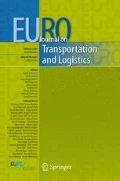Abstract
We present improvements of the Frank–Wolfe (FW) method for static vehicular traffic and telecom routing. The FW method has been the dominating method for these problem types, but due to its slow asymptotic convergence it has been considered dead by methods oriented researchers. However, the recent introduction of conjugate FW methods has shown that it is still viable, and in fact the winner on multi-core computers. In this paper, we show how to speed up the FW iterations, by updating the subproblems in the FW method, instead of solving them from scratch. The subproblem updating is achieved by viewing the subproblems as network flow problems with a threaded representation of the shortest path trees. In addition, we introduce a new technique, thread following, implying that a single traversal of the thread is enough to find a new shortest path tree. Our computational tests show that very few nodes in practice are visited more than once when searching for improving arcs. Moreover, we update also the all-or-nothing solutions of the subproblems, resulting in significantly reduced loading times. For a set of standard test problems, we observe speedups in the region of 25–50 % for the subproblem updating FW method, compared to the traditional non-updating version. We typically achieve higher speedups for more difficult problems and converged solutions.






Similar content being viewed by others
References
Ahuja RK, Magnanti TL, Orlin JB (1993) Network flows. Prentice-Hall, Upple Saddle River
Arezki Y (1986) Comparison of some algorithms for equilibrium traffic assignment with fixed demands. In: Proceedings of 14th PTRC Summer Annual Meeting, Sussex University, England, vol P282, pp 123–135
Arezki Y, Van Vliet D (1990) A full analytical implementation of the PARTAN/Frank–Wolfe algorithm for equilibrium assignment. Transp Sci 24(1):58–62
Bar-Gera H (2002) Origin-based algorithm for the traffic assignment problem. Transp Sci 36(4):398–417
Bar-Gera H (2010) Traffic assignment by paired alternative segments. Transp Res Part B 44(8–9):1022–1046
Bazaraa MS, Jarvis JJ, Sherali HD (1990) Linear programming and network flows. Wiley, Toronto
Benichou MJ, Cautier J, Hentges G, Ribiere G (1977) The efficient solution of large scale linear programming problems. Math Progr 13:280–322
Bruynooghe M, Gibert A, Sakarovitch M (1969) Une methode d’affectation du trafic. In: Proceedings of the 4th international symposium on the theory of road traffic flow, Bundesministerium für Verkehr, Bonn, Karlsruhe, pp 198–204
Caliper Corporation (2010) What TransCAD users should know about new static traffic assignment methods. Caliper Corporation Communication to Users
Chen A, Jayakrishnan R, Tsai W (2002) Faster Frank–Wolfe traffic assignment with new flow update scheme. J Transp Eng 128(1):31–39
Dial R (2006) A path-based user-equilibrium traffic assignment algorithm that obviates path storage and enumeration. Transp Res Part B 40:917–936
Florian M, Constantin I, Florian D (2009) A new look at projected gradient method for equilibrium assignment. Transp Res Rec 2090:10–16
Frank M, Wolfe P (1956) An algorithm for quadratic programming. Nav Res Log 3:95–110
Fratta L, Gerla M, Kleinrock L (1973) The flow deviation method: an approach to store-and-forward communication network design. Networks 3:97–133
Fukushima M (1984) A modified Frank–Wolfe algorithm for solving the traffic assignment problem. Transp Res Part B 18(2):169–177
Gallo G, Pallottino S (1988) Shortest path algorithms. Ann Oper Res 13:3–79
Gentile G (2012) Local user cost equilibrium: a bush-based algorithm for traffic assignment. Transportmetrica. doi:10.1080/18128602.2012.691911
Glover F, Klingman D, Stutz J (1974) Augmented threaded index method for network optimization. INFOR 12(3):293–298
Hearn DW, Lawphongpanich S, Ventura JA (1985) Finiteness in restricted simplicial decomposition. Oper Res Lett 4(3):125–130
Holmgren J (2004) Efficient updating shortest path calculations for traffic assignment. Master’s thesis, Department of Mathematics, Linköping Institute of Technology, Linköping
Larsson T, Patriksson M (1992) Simplicial decomposition with disaggregated representation for the traffic assignment problem. Transp Sci 26(1):4–17
Larsson T, Patriksson M, Rydergren C (1997) Applications of simplicial decomposition with nonlinear column generation to nonlinear network flows. In: Pardalos PM, Hearn DW, Hager WW (eds) Network optimization. Springer, Berlin, pp 346–373
LeBlanc LJ (1973) Mathematical programming algorithms for large scale network equilibrium and network design problems. PhD thesis, IE/MS Department, Northwestern University, Evanston, IL
LeBlanc LJ, Helgason RV, Boyce DE (1985) Improved efficiency of the Frank–Wolfe algorithm for convex network programs. Transp Sci 19(4):445–462
Lee DH, Nie Y (2001) Accelerating strategies and computational studies of the Frank–Wolfe algorithm for the traffic assignment problem. Transp Res Rec 1771:97–105
Lindberg PO (2009) On methods for the convex multi-commodity flow problem. Int J Pure Appl Math 50(2):157–164
Lupi M (1986) Convergence of the Frank–Wolfe algorithm in transportation network. Civ Eng Syst 3:7–15
Mitradjieva M, Lindberg PO (2013) The stiff is moving—conjugate direction Frank–Wolfe methods with applications to traffic assignment. Transp Sci 47(2):280–293
Mulvey JM (1978) Pivot strategies for primal-simplex network codes. J ACM 25(2):266–270
Nguyen S, James L (1975) TRAFFIC—an equilibrium assignment program. Universite de Montreal, Centre de recherche sur les transports, (publication no. 17)
Nie Y (2009) A class of bush-based algorithms for the traffic assignment problem. Transp Res Part B 44:73–89
Ouorou A, Mahey P, Vial JP (2000) A survey of algorithms for convex multicommodity flow problems. Manag Sci 46(1):126–147
Patriksson M (1994) The traffic assignment problem—models and methods. VSP, Utrecht
Weintraub A, Ortiz C, Gonzaalez J (1985) Accelerating convergence of the Frank–Wolfe algorithm. Transp Res Part B 19:113–122
Zhou Z, Brignone A, Clarke M (2010) Computational study of alternative methods for static traffic equilibrium assignment. In: Proceedings of the World Conference on Transport Research Society (WCTRS), Lisbon, Portugal
Author information
Authors and Affiliations
Corresponding author
Rights and permissions
About this article
Cite this article
Holmgren, J., Lindberg, P.O. Upright Stiff: subproblem updating in the FW method for traffic assignment. EURO J Transp Logist 3, 205–225 (2014). https://doi.org/10.1007/s13676-013-0031-3
Received:
Accepted:
Published:
Issue Date:
DOI: https://doi.org/10.1007/s13676-013-0031-3




